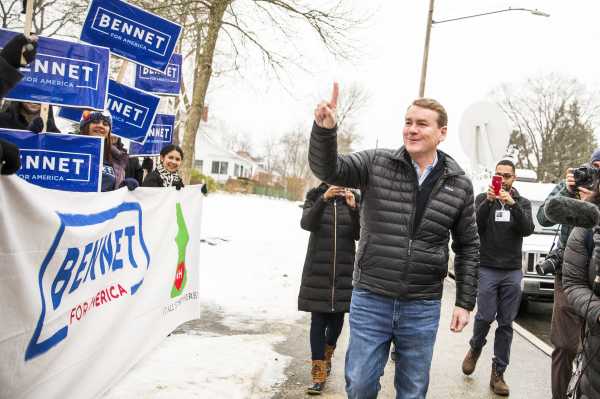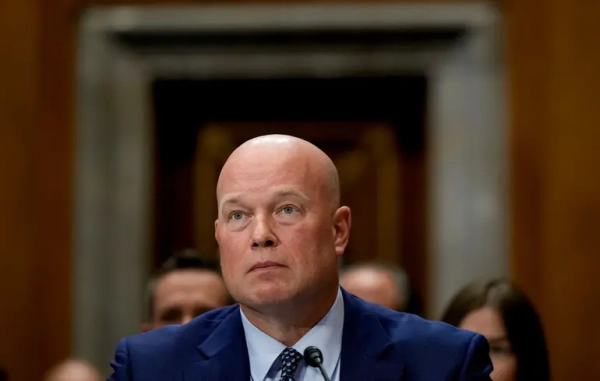
Michael Bennet, the moderate senator from Colorado and former head of the Denver public school system, has ended his bid for the Democratic nomination for president before the final results were released in the New Hampshire primary.
Consciously and repeatedly rejecting proposals for huge, transformative change like Medicare-for-all, Bennet occupied a moderate lane in the primary as an advocate for incremental tax and spending increases more in line with the Obama administration than the platform of, say, Sen. Bernie Sanders. He argued, “Voters are sick and tired of politicians promising them things that they know they can’t deliver,” favoring instead a more measured course he thought could actually pass Congress. He developed a reputation as staid, perhaps unexciting, and after falling out of televised debates, he struggled to gain much of a national reputation.
Bennet ran on a platform he described as “the Real Deal,” positioned as a set of economic policies to improve middle-class living standards that were, per him, more achievable than sweeping policies like Medicare-for-all. He particularly emphasized proposals that help working families, like universal preschool for 3- and 4-year-olds, and paid medical and family leave.
His most distinctive proposal, which he’s fought for since 2017 in the Senate, is a child benefit that would give all but the richest families $250 to $300 per month, per child, with no strings attached. The plan would cut child poverty in the US roughly in half, according to one study. While the other senators in the Democratic field have endorsed the idea, it originated with Bennet and he placed the biggest emphasis on it. He unveiled a wide range of other anti-poverty proposals as well, proposing a dramatic expansion of public housing vouchers (which only one-fourth of eligible people receive currently) and of federal funding for homelessness services.
The rest of his platform was generally more modest in scale and moderate than the platforms of his competitors. On health care, he favored a public option proposal he developed with Sen. Tim Kaine (D-VA) called “Medicare X,” only available to individuals and small businesses on the health care exchanges and not available to employers already providing coverage. A study (commissioned by a hospital interest group, so caveat emptor) found that the proposal would direct about 40 million people into the public plan, lower than some other public option plans and far lower than Medicare-for-all plans.
Bennet stood alone in the field in calling for a $15-an-hour minimum wage only in high-cost cities and a $12 minimum elsewhere; other candidates backed a uniform $15 minimum. He proposed raising the top tax rate for the richest to 44 percent, taxing investment income as it’s earned (a proposal called “mark to market”), and raising corporate tax rates, all substantial moves but ones that lacked the flash of Sens. Bernie Sanders and Elizabeth Warren’s dramatic wealth tax plans.
Bennet represents the typical Senate Democrat, who’s to the right of the other candidates
Bennet never carved out a niche for himself as the Democratic Party’s moderate pick for the nomination.
As the 2020 primary continued, the moderate wing of the party came to be represented by former Vice President Joe Biden and former South Bend, Indiana, Mayor Pete Buttigieg. But in many ways, they were worse avatars for Democratic centrism than Bennet, who crafted his “Real Deal” with an eye to what his colleagues in the Senate Democratic caucus would rally behind.
Whereas Biden has called for a public option available even to workers with employer-based coverage — a policy that would represent a major disruption to the existing system — Bennet’s “Medicare X” is only available on the individual and small-business markets. Bennet’s child allowance plan has 38 Senate Democrats backing it, far more than any other candidate’s trademark spending plan.
At the same time, Bennet emphasized policies that don’t need congressional buy-in but which the rest of the field often overlooked. He, for instance, had the most aggressive monetary policy platform of any candidate, calling on the Federal Reserve to put workers and wage increases first instead of focusing on preventing inflation.
This is not to say that Bennet’s agenda was tepid. The conservative Tax Foundation, in a mostly critical analysis, estimated that Bennet’s policies would cost $6 trillion over 10 years, including (in addition to the aforementioned policies) a sixfold increase in the earned income tax credit for single people, an increase in the premium tax credit in Obamacare, and a $500 billion “investment” in workers without college degrees.
In a crowded field, however, Bennet’s agenda had trouble breaking through when candidates like Sanders and Warren were proposing fully nationalizing health insurance and imposing large wealth taxes designed to draw down the fortunes of America’s richest residents.
His brother, New York Times editorial page editor James Bennet, recused himself from the newspaper’s opinion coverage of the campaign, to avoid an appearance of a conflict of interest.
Without the momentum of Buttigieg or Biden (or even Sen. Amy Klobuchar), Bennet had trouble breaking through as a moderate option. But his candidacy still matters in part because his whole policy strategy was an attempt to map a course that a Democratic Senate with a Democratic president could actually pass without alienating moderate senators from red states. Whoever the next president is, the odds are their eventual policy record may look more like Bennet’s platform than their own.
Sourse: vox.com






